#Julius Caesar national theatre
Explore tagged Tumblr posts
Text
My current and pressing list of things to watch is full of things I cannot physically watch (three hours long or a serie or both) but I need to. I can't think of anything else
#btw the list is#the borgias#Julius Caesar national theatre#Julius Caesar donmar warehouse#hbo rome but only the bits with Cassius#yeah I know#Twelfth night rsc production#maybe The tempest donmar warehouse#Coriolanus donmar warehouse. at least I think it's donmar warehouse#Julius Caesar (1953) maybe#also Twelfth night national theatre#I should find some King Lear#and I just discovered that a bunch of books I downloaded are formatted so weirdly I can't read them#personal#I'm losing my mind here
5 notes
·
View notes
Text
hey you!! yes, you!
do you want to watch Colin Morgan in All My Sons (legally and for free)?
do you want to celebrate the Ides of March by watching an excellent production of Julius Caesar with Ben Whishaw? (of course you do??)
as well as other plays?
you can use the code SORTEDATHOME to get free access to National Theatre at Home for 1 month! (also access to some "recipe packs" if you're into that)
More info here. I've just done it and it's very straightforward (you need to provide the details of an active credit card though, there's a card check). Just remember to cancel your subscription before it renews :)
ETA: Offer available until 18 March, while stocks last (from the NTL newsletter)

#I'm not in any way affiliated to the national theatre#this could save so many lives. mine included#colin morgan#ben whishaw#ides of march#< lol. I want this to reach people ok! it's important#national theatre#national theatre at home#fleabag#all my sons#julius caesar#shakespeare#signal boost
144 notes
·
View notes
Text


Brutus speech
102 notes
·
View notes
Text
Today, the Ides of March, is my birthday! So I'm going to watch Kit Young as Octavius in the National Theatre's Julius Caesar (2018). Seems apropos.

#kit Young#octavius#julius caesar#national theatre#ides of march#my birthday#six of crows#grishaverse#shadow and bone#kit young#shakespeare
23 notes
·
View notes
Text
Anyone happen to know where a girl can find the 2018 Bridge Theatre Julius Caesar that ran on National Theatre Live? Usual channels are a bust.
15 notes
·
View notes
Text
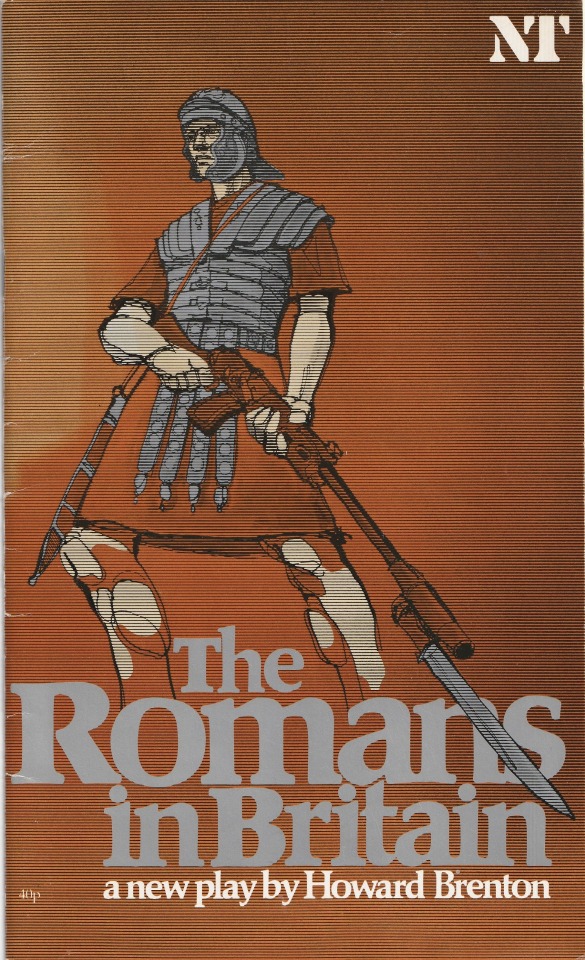
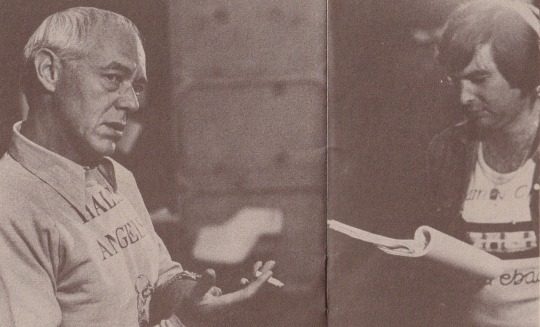
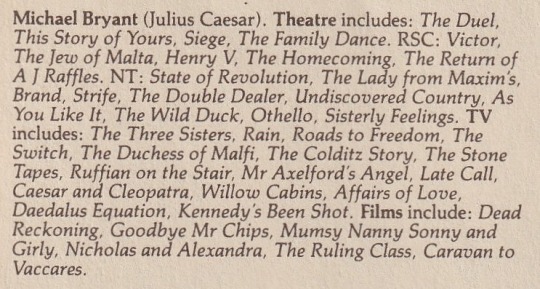
In 1980, Michael Bryant appeared as Julius Caesar in the highly controversial play The Romans in Britain by Howard Brenton. The director, Michael Bogdanov, found himself at the heart of a private prosecution brought about by moral crusader Mary Whitehouse regarding a particular scene in the play. When it finally came to trial the prosecution withdrew their case after a particularly dazzling performance by defence barrister Jeremy Hutchinson (there is an excellent chapter about this in the book 'Jeremy Hutchinson's Case Histories').
#michael bryant#julius caesar#the romans in britain#national theatre#howard brenton#michael bogdanov#1980#jeremy hutchinson
9 notes
·
View notes
Link
Click on fb.watch in upper left corner. Very moving and exceptionally well done.
1 note
·
View note
Text


Bridgerton’s Jonathan Bailey is to play Richard II in a new production of Shakespeare’s history play directed by Nicholas Hytner at the Bridge theatre in London.
It will reunite the star with Hytner, whose version of Othello at the National Theatre in 2013 featured Bailey as Cassio. Bailey also played Edgar opposite Ian McKellen’s King Lear at Chichester Festival theatre in 2017. But the part of the Plantagenet monarch will be the highest profile Shakespeare role to date for the actor, who is best known for playing Lord Anthony Bridgerton in Netflix’s blockbuster period drama. Performances will begin at the Bridge on 10 February.
The question asked by Shakespeare’s Richard II, said Hytner, is: “What do you do when a ruler is absolutely inadequate? How do you get rid of the rightful leader?” The play has an ambiguity characteristic of Shakespeare, who does not “give us his own opinion”, said Hytner. “On the one hand, the play endorses Richard’s right to rule and on the other hand it appears to endorse [his adversary] Bolingbroke’s greater capacity to rule.” The production will reveal “a feudal world on the cusp of modernity” he said.
It will be designed by Bob Crowley and staged in what Hytner described as “a cross between in-the-round and traverse”, rather than the immersive, promenade style of Hytner’s Julius Caesar and A Midsummer Night’s Dream, which brought audiences up close to the actors at the Bridge. “Richard II has a delicacy and interiority that isn’t going to respond to that kind of treatment,” he said, adding that the theatre – which opened by Tower Bridge in 2017 – is a very flexible space.
Richard II will follow Guys and Dolls which has run at the venue since March 2023 and will have its last performance on 4 January. “We didn’t think it would last as long as it did,” said Hytner, who explained that the long run of the widely acclaimed musical had given the theatre “a bit of financial stability”. He wanted to stage a musical in the same spirit in which he had done Julius Caesar and A Midsummer Night’s Dream: “Guys and Dolls was the right choice for that kind of treatment, because it has a big, robust heart and there’s a direct appeal to the audience, a connection that allows you to plunge straight into it.”
The Bridge is the flagship venue of London Theatre Company which was founded by Hytner and Nick Starr. Its other space is Lightroom in King’s Cross, where an immersive David Hockney exhibition has returned for another run, alongside a multimedia experience about the Apollo Moon landings. It will eventually host live performance too. “The very long term plan is that it’s a theatre, but it’s working so well and we have so many things in the pipeline in that [multimedia] form that I can’t say when,” said Hytner.
Richard II will be at the Bridge theatre, London, from 10 February to 10 May
Source
56 notes
·
View notes
Text
Luke Thompson Master Drive
Crossed out titles are not in this drive but can be easily found (exceptions marked with asterisks and detailed under the cut). Crossed out and red means that although the productions have been recorded there are no files available.
If you want access to it just DM me!
Shakespeare's Globe: A Midsummer Night's Dream (2014)
The Suspicions of Mr. Whicher (2011‑2014)
Hampstead Theatre at Home: Tiger Country (2014)
Globe on Screen: Julius Caesar (2015)
The Complete Walk: Romeo and Juliet (2016)
In the Club (2014‑2016) NEW!
Dunkirk (2017)
Hamlet (2018)
Kiss Me First (2018-2018)
National Theatre Live: King Lear (2018)
Making Noise Quietly (2019)
Misbehaviour (2020)
Tikkun Olam (2022)*
Transatlantic (2023-2023)
A Little Life (2023)
Bridgerton (2020‑ )
* = This one was available for a year to rent online but it seems that no one did a screen recording so it’s unavailable for the time being.
44 notes
·
View notes
Text
Good things of the day:
Subbed for an online teacher who is on her honeymoon (going to be doing a fair amount of that this coming week) and had a lovely time talking about the three pillars of rhetoric with a very talkative class. We watched a couple of clips from National Theatre and RSC productions of "Julius Caesar," and the students really got into discussing what Antony and Brutus did well, and where their methods grew fallacious or manipulative.
Didn't sleep at all well, but had time for a good nap to make it up.
Went to adore Jesus in the Blessed Sacrament. Very blessed to be able to go every Friday.
Had a nice walk with my brother.
#I'm in a lonesome mood and - shame on me - feeling resentful of a situation I'm actually blessed to be in#so focusing on the good is probably a good practice tonight#I have so much wonderfulness in my life and I'm not great at being grateful for it.#fortifying against the dismalness
13 notes
·
View notes
Text
Solo Travel: Find Magic.
Venturing out on a solo vacation can be daunting. There’s a shit-ton of adulting you’ll need to do:
It’s up to you to make your flight. It’s up to you to not lose anything. It’s up to you to stay hydrated and healthy and mindful and motivated.
It can be easy to give in and say “hard nope” and stay home, even if you really want to start travelling solo.
How do you get past all that, and find the will to save up, plan, gear-up, get a passport or a reliable road-trip vehicle, and go? Magic. You believe in magic and you let yourself want it.
When I was in my late teens I was in a waiting room and idly flipping through a magazine (it was the late 80s). I turned the page and there was a two-page tourism ad with a massive photo of Lake Louise, in Banff National Park. Supernaturally milky blue water, tiny red canoes, backed by a colossal wall of mountain capped by an ancient glacier. I remember murmuring aloud, “I want that.” I wanted to feel what that photographer felt. I wanted awe. I wanted magic.
Years later, I finally had enough of my shit together to go there, and it was everything I expected, and it made all the hard adulting worth it. (I wound up moving to Calgary so I could go to Lake Louise any time I wanted to.)

Photo 1: Lake Louise, Alberta. (This is from 2012, and taken with an old iPhone 4S, but it most closely resembles the view I saw in the magazine ad.)
In 2003, I saw a video about Tofino and Pacific Rim National Park. By 2003 I had plenty of experience going on budged-friendly road trips to Vancouver, where I’d stay in the (at the time, affordable) Jericho Beach Hostel. But Tofino would cost more, require a longer vacation, and take me way out of my “there’s always a city close by” comfort zone. But I wanted to see real waves, walk through a real coastal rain forest, and see the ocean fog roll in. I wanted magic,

Photo 2: My (used) 1998 Pontiac Sunfire, and a budget kayak, and my mediocre Norco mountain bike, somewhere at a rest stop along the trans Canada Highway, in British Columbia
By 2005 I had the right gear, a decent budget, and enough self-confidence to drive out and hike down sketchy wooden stairs to Half Moon Bay near Uclulet and see the actual Pacific Ocean—not the Salish Sea between Vancouver and Vancouver Island—for the first time. That week I felt the magic of being at the edge of my world. It made all the adulting easy.


Photos 3 & 4: The first time I saw the Pacific Ocean without Vancouver Island or the Olympic Peninsula lining the horizon, and the first time I saw fog move in over Vancouver island from the Pacific Ocean,
Ever since my 8th and 9th grade teachers told us stories about the old Globe theatre, I’ve dreamt of seeing a play in the rebuilt Globe in London (back then, even rebuilding the Globe was still a dream that wouldn’t be finished until the late 90s). But I live an ocean away, in Canada, I’m introverted, and no matter how much money I make, I have always felt like I’m out of my class-depth at any social gathering. Wrong childhood neighbourhoods, wrong schools, wrong career field. It took me until my 2nd trip to England to work up the nerve to buy a ticket to see a play at the Globe. I wanted to be there like one of the people I imagined during English class as we studied Romeo & Juliet, Julius Caesar, and The Scottish Play. I wanted the magic.
Friday night, August 23, 2024, I spent two hours almost dizzy with a flood of feelings I’m going to need months to process, because I sat in Bay H, Row C, Seat 29, at Shakespeare’s Globe, in London, and watched a beautiful, perfect, magical performance of Much Ado about Nothing, and like I said, I’m going to be sorting out my feelings about this for months.
Yes there’s the Osemanverse overlap, Much Ado appears in Loveless. There’s the Aroace angle, watching two seemingly aro characters get shipped by their friends and family, bla bla bla. There’s a lot. But whatever. For me the magic was being the adult who teenage-me grew up into, sitting there in my seat that I absolutely belonged in, on my trip that I put together for myself, to chase down dozens of my other lifelong dreams, sitting there, and feeling that I was allowed to be there, and then delighting in the magic of live theatre, compounded by the magic of loving myself enough to push through every excuse not to be there.

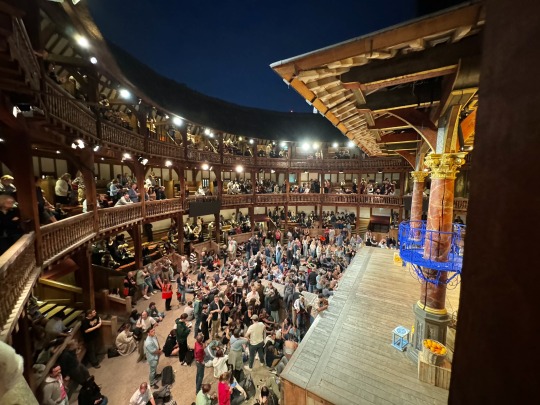
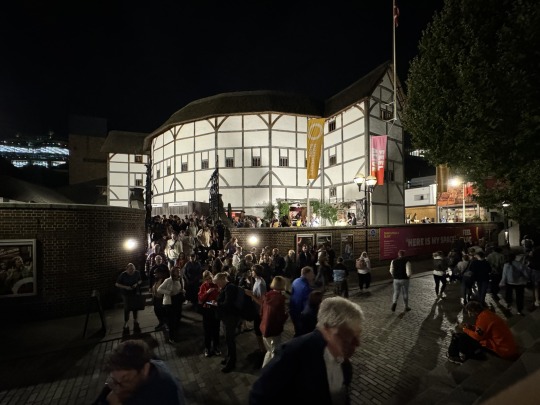
Photos 5, 6, and 7: The Globe Theatre (there’s no photography during the performance, and I don’t think I’d have bothered, if there was.
Find your magic. Thrive. It doesn’t have to cost a lot: My first solo trips cost me a tank of gas and a tenting campground fee, or a night’s stay at a hostel. It doesn’t need to be risky: Backpacker hostels and modern hotels often have more sophisticated security than your home or workplace. It doesn’t have to be ambitious: Maybe it’s lunch at a diner in a small farm town nearby, maybe it’s a low-key late summer concert in a park, maybe it’s building that sandcastle you never got to build because you grew up far away from water. Whatever it is, go find it! Let it change you.
#solo travel#asexual travel#aromantic travel#asexual#aromantic#aroace#banff national park#lake louise#tofino
12 notes
·
View notes
Text
I've ordered a DVD of The Globe's 2013 production of The Tempest off eBay for £3, which is suspiciously cheap. it might or might not get delivered, and if it does it might or might not work. fingers crossed
#i suppose if it's some scam vendor i only lost £3?#i wanted to try the globe's streaming subscription but you can only buy the yearly one#i would definitely pay for 1 month but 1 year? idk#though there's also a production of julius caesar with luke thompson that i so want to watch#but i could pay for that individually i suppose#hey did anyone watch best of enemies with zachary quinto#it's available for streaming now on the national theatre at home platform#i quite liked it (saw a screening of it). do watch it if you can#I also liked their latest othello#i think i'll subscribe for another month bc i'd like to rewatch best of enemies#sorry to go on about random stuff. feel free to talk theatre to me btw#i am praying for colin or ben whishaw to come back to the stage#manifesting 🕯️🕯️🕯️#ben whishaw said “no more theatre” in a recent(ish) interview and i was gutted 😔#*not merlin#personal#i guess
35 notes
·
View notes
Note
Hello! I'm really interested in ancient rome and would love to watch some shows or films based on it. Not anything educational but more so entertaining so do you have any recs? What are your favorite pieces of media about this time period?
Oh this is my personal playground lol here are some:
For tv:
Rome HBO of course is a must watch
I, Claudius too is one that will come up a lot, but keep in mind that it's an old made for tv production so it's very dated in terms of production (but so influential that it's not as dated as it could've been in terms of writing - save for how sexist it is lol)
Domina SKY is very much I, Claudius: Girlboss Edition, recommend if you love awful women and awful marriages
I adore Spartacus! It's very stylized and not for everyone, but I loooove it. Recommend if you like Black Sails because it has similar themes
Britannia, Romulus and Barbarians are ones that I either haven't got around to watch or fell behind but they are worth it afiak
For movies:
Imperium: Augustus and Imperium: Nero are.... everything to me. Especially the later. Doesn't mean that they are good lol but if you love messy families as much as I do then this is it
Il Primo Re is about Romulus and Remus, it's shot entirely in latin and it's soooo good
Any movie about Cleopatra? I'm partial to the liz taylor version from 1963, but if 4-hour long old hollywood epics aren't your thing then go with the one from 1999
Speaking of old hollywood, Julius Caesar 1953, especially if you're a Shakespeare nerd. If you can get your hands on the national theatre production of Antony and Cleopatra w/ Ralph Fiennes and Sophie Okonedo, do it!!! It's my favorite
Hannibal: Rome's Worst Nightmare is a documentary I guess but it's entertaining to ME Alexander Siddig is perfect in it
Gladiator gets soo many points for "not educational but entertaining"
Agora with Rachel Weisz and Oscar Isaac!!
#look at how normal i am not recommending caligula 1979#anyway definitely start w/ rome hbo if you haven't watched it already
32 notes
·
View notes
Text
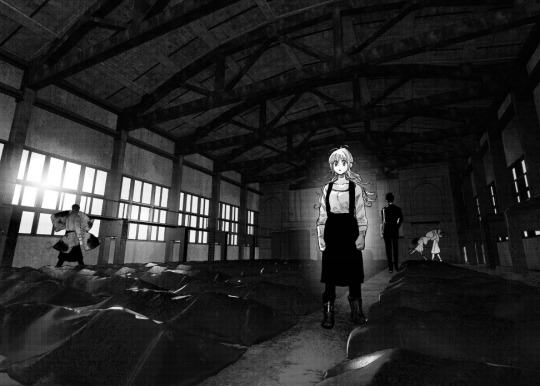
CHOUJIN X Chapter 40, Thoughts
Post timeskip the plot is quickly picking up from chapter to chapter. While the majority of this chapter is just spent with Tokio investigating with his new team, there’s some interesting ideas introduced on the other sie of the story, following Batista and Palmia the choujin with the ability to bring others back to life. More thoughts underneath the cut.
Homo Superior
Choujin X borrows a lot from X-Men. It’s in the title if you haven’t noticed. Including the fact that society is changed by a small number of people in the population suddenly gaining superpowers through a randomly given genetic mutation.
Even the concept of “Choujin X” itself, the strongest of all choujins who is rumored to have the ability to shape the world most likely comes from comic book concepts like “omega level mutants” and the character “apocalypse” who often shows up in a villain in the x-men stories as the first mutant who possesses power greater than any other mutant.
I’m not saying Ishida ripped off X-Men or anything along those lines, but the two works share a lot in common that they merit comparison. X-Men’s most famous villain Magneto is a former holocaust victim turned mutant who believes in mutant supremacy. This is a vast oversimplification of Magneto’s beliefs, but more or less he believes that humans will inevitably fear and try to oppress mutants with their superior numbers while they’re still in the minority, but that mutants are actually the next step in human evolution and will rise up to replace them.
It’s less that Magneto believes that mutants are inherently superior, but rather he fights for the liberation of mutants as he believes humans will inevitably always try to oppress them out of fear. The classic comparison (which is again an oversimplification) is that Charles Xavier was Martin Luther King, and Magneto is written as Malcolm X. Magneto supports the idea of Mutant’s finding liberation separate from human society rather than blending in with humans as he doesn’t believe the two can mix.
Choujin X is also a story which depicts a conflict between an organization that regulates Choujins and the use of their power so they can blend into a society where they are a minority, and a group of radical choujin who exist outside of that society. With Yamato Mori currently being the enforcers of that order regulating which Choujin are permitted to use their powers, and punishing those who use their powers without permission.
However, while X-Men takes place in what is mostly our world just with mutants thrown in, Choujin X exists in what is called a “nationless world.”

In the past around world war one in our time the War Choujin Queem led a military coup using a batallion of all Choujins, and then after seizing control of his nation went to war with all of his neighboring countries, including the pacific asian theatre. This sparked countries to deploy choujin as literal super soldiers which pushed a war that suprassed all wars. Even when Queem died the wars did not cease which caused every nation in the world to collapse, and the only way society has survived is through a series of self-governing prefectures which I assume operates like city-states.
Post canon we learn not all of these city-states operate as lawfully as the Yamato Prefecture. There are places like Iwato that are run by Warlord like Choujin instead who wield absolute power.

Not only that but an extra in the first volume reveals that history has been shaped time and time again, by choujin with special powers rising into the ranks of leadership. Apparently in this world Julius Caesar was counted among the Choujin if him appearing in this extra is to be believed.

That is to say Choujin are inidviduals who have a great ability to disrupt or change the society they are a part of, the existence of Choujins being used in war ended up bringing an end to all nations in the world. It seems like the only reason they aren’t completely dominating the world is because they’re vastly outnumbered. Therefore, this chapter posits what would happen if Choujin were no longer 1/1000.


Which asks the question if Choujin were to no longer be the minority, then what would happen to regular humans? Would they be obsolete now and replaced by Choujin entirely?
That might just be like Magneto, the aim of people like Batista and Zora’s followers in spreading around a drug that can awaken Choujins.

We might be one step closer to understanding what exactly Batista’s goals are in allying with Zora. As so far Zora’s followers just seem to be a bunch of eccentrics with odd dreams abusing their powers as Choujin on innocent people, simply because they have those powers, and believe in individual right of the strong, but as the story progresses we might see their more complex motivations. In Chapter 37 one of her followers suggests that Zora is currently the only one giving a safe-haven to outcasts like them.


Which further suggests we might be building up to this sort of Charles Xavier vs. Magneto storyline when it comes to the beliefs of the heros and villains, that Yamato Mori believes in oppressing the rights of individual Choujin in order to create a society safer for normal humans who make up the majority, and then the choujin who are the radical outsiders of the society who want to dissolve that society’s rules.
#Choujin x#choujin x meta#cx meta#choujin x 40#choujin x chapter 40#choujin x spoilers#batista hoshi#ishida sui
13 notes
·
View notes
Text
So I watched the 2018 Bridge Theatre Julius Caesar on National Theatre at Home last night. That Ben Wishaw sure can do some Shakespeare, they made great use of the venue (using the audience as the crowd? Love.), and the play really is “oh THAT’S where that line comes from” for two hours, but honestly I didn’t realize how…light on plot the play is? Idk I’m a comedy girlie I’m used to at least two subplots and one of them needs to involve the silliest guy you’ve ever seen.
Shakespeare friends please interact
13 notes
·
View notes
Text

William Shakespeare, Shakespeare also spelled Shakspere, byname Bard of Avon or Swan of Avon, (baptized April 26, 1564, Stratford-upon-Avon, Warwickshire, England—died April 23, 1616, Stratford-upon-Avon), English poet, dramatist, and actor often called the English national poet and considered by many to be the greatest dramatist of all time.
Shakespeare occupies a position unique in world literature. Other poets, such as Homer and Dante, and novelists, such as Leo Tolstoy and Charles Dickens, have transcended national barriers, but no writer’s living reputation can compare to that of Shakespeare, whose plays, written in the late 16th and early 17th centuries for a small repertory theatre, are now performed and read more often and in more countries than ever before. The prophecy of his great contemporary, the poet and dramatist Ben Jonson, that Shakespeare “was not of an age, but for all time,” has been fulfilled.
William Shakespeare
Category: Arts & Culture
Baptized: April 26, 1564 Stratford-upon-Avon England
Died: April 23, 1616 Stratford-upon-Avon England
Notable Works: “A Midsummer Night’s Dream” “All’s Well That Ends Well” “Antony and Cleopatra” “As You Like It” “Coriolanus” “Cymbeline” First Folio “Hamlet” “Henry IV, Part 1” “Henry IV, Part 2” “Henry V” “Henry VI, Part 1” “Henry VI, Part 2” “Henry VI, Part 3” “Henry VIII” “Julius Caesar” “King John” “King Lear” “Love’s Labour’s Lost” “Macbeth” “Measure for Measure” “Much Ado About Nothing” “Othello” “Pericles” “Richard III” “The Comedy of Errors” “The Merchant of Venice” “The Merry Wives of Windsor” “The Taming of the Shrew” “The Tempest” “Timon of Athens”
Movement / Style: Jacobean age
Notable Family Members: spouse Anne Hathaway
It may be audacious even to attempt a definition of his greatness, but it is not so difficult to describe the gifts that enabled him to create imaginative visions of pathos and mirth that, whether read or witnessed in the theatre, fill the mind and linger there. He is a writer of great intellectual rapidity, perceptiveness, and poetic power. Other writers have had these qualities, but with Shakespeare the keenness of mind was applied not to abstruse or remote subjects but to human beings and their complete range of emotions and conflicts. Other writers have applied their keenness of mind in this way, but Shakespeare is astonishingly clever with words and images, so that his mental energy, when applied to intelligible human situations, finds full and memorable expression, convincing and imaginatively stimulating. As if this were not enough, the art form into which his creative energies went was not remote and bookish but involved the vivid stage impersonation of human beings, commanding sympathy and inviting vicarious participation. Thus, Shakespeare’s merits can survive translation into other languages and into cultures remote from that of Elizabethan England.
Shakespeare the man
Life
Although the amount of factual knowledge available about Shakespeare is surprisingly large for one of his station in life, many find it a little disappointing, for it is mostly gleaned from documents of an official character. Dates of baptisms, marriages, deaths, and burials; wills, conveyances, legal processes, and payments by the court—these are the dusty details. There are, however, many contemporary allusions to him as a writer, and these add a reasonable amount of flesh and blood to the biographical skeleton.
Shakespeare Reading, oil on canvas by William Page, 1873-74; in the collection of the Smithsonian American Museum of Art, Washington, D.C. (William Shakespeare)
Shakespeare's birthplace
The parish register of Holy Trinity Church in Stratford-upon-Avon, Warwickshire, shows that he was baptized there on April 26, 1564; his birthday is traditionally celebrated on April 23. His father, John Shakespeare, was a burgess of the borough, who in 1565 was chosen an alderman and in 1568 bailiff (the position corresponding to mayor, before the grant of a further charter to Stratford in 1664). He was engaged in various kinds of trade and appears to have suffered some fluctuations in prosperity. His wife, Mary Arden, of Wilmcote, Warwickshire, came from an ancient family and was the heiress to some land. (Given the somewhat rigid social distinctions of the 16th century, this marriage must have been a step up the social scale for John Shakespeare.)
Stratford enjoyed a grammar school of good quality, and the education there was free, the schoolmaster’s salary being paid by the borough. No lists of the pupils who were at the school in the 16th century have survived, but it would be absurd to suppose the bailiff of the town did not send his son there. The boy’s education would consist mostly of Latin studies—learning to read, write, and speak the language fairly well and studying some of the Classical historians, moralists, and poets. Shakespeare did not go on to the university, and indeed it is unlikely that the scholarly round of logic, rhetoric, and other studies then followed there would have interested him.
Instead, at age 18 he married. Where and exactly when are not known, but the episcopal registry at Worcester preserves a bond dated November 28, 1582, and executed by two yeomen of Stratford, named Sandells and Richardson, as a security to the bishop for the issue of a license for the marriage of William Shakespeare and “Anne Hathaway of Stratford,” upon the consent of her friends and upon once asking of the banns. (Anne died in 1623, seven years after Shakespeare. There is good evidence to associate her with a family of Hathaways who inhabited a beautiful farmhouse, now much visited, 2 miles [3.2 km] from Stratford.) The next date of interest is found in the records of the Stratford church, where a daughter, named Susanna, born to William Shakespeare, was baptized on May 26, 1583. On February 2, 1585, twins were baptized, Hamnet and Judith. (Hamnet, Shakespeare’s only son, died 11 years later.)
How Shakespeare spent the next eight years or so, until his name begins to appear in London theatre records, is not known. There are stories—given currency long after his death—of stealing deer and getting into trouble with a local magnate, Sir Thomas Lucy of Charlecote, near Stratford; of earning his living as a schoolmaster in the country; of going to London and gaining entry to the world of theatre by minding the horses of theatregoers. It has also been conjectured that Shakespeare spent some time as a member of a great household and that he was a soldier, perhaps in the Low Countries. In lieu of external evidence, such extrapolations about Shakespeare’s life have often been made from the internal “evidence” of his writings. But this method is unsatisfactory: one cannot conclude, for example, from his allusions to the law that Shakespeare was a lawyer, for he was clearly a writer who without difficulty could get whatever knowledge he needed for the composition of his plays.
Career in the theatre of William Shakespeare
The first reference to Shakespeare in the literary world of London comes in 1592, when a fellow dramatist, Robert Greene, declared in a pamphlet written on his deathbed:
There is an upstart crow, beautified with our feathers, that with his Tygers heart wrapt in a Players hide supposes he is as well able to bombast out a blank verse as the best of you; and, being an absolute Johannes Factotum, is in his own conceit the only Shake-scene in a country.
What these words mean is difficult to determine, but clearly they are insulting, and clearly Shakespeare is the object of the sarcasms. When the book in which they appear (Greenes, groats-worth of witte, bought with a million of Repentance, 1592) was published after Greene’s death, a mutual acquaintance wrote a preface offering an apology to Shakespeare and testifying to his worth. This preface also indicates that Shakespeare was by then making important friends. For, although the puritanical city of London was generally hostile to the theatre, many of the nobility were good patrons of the drama and friends of the actors. Shakespeare seems to have attracted the attention of the young Henry Wriothesley, the 3rd earl of Southampton, and to this nobleman were dedicated his first published poems, Venus and Adonis and The Rape of Lucrece.
One striking piece of evidence that Shakespeare began to prosper early and tried to retrieve the family’s fortunes and establish its gentility is the fact that a coat of arms was granted to John Shakespeare in 1596. Rough drafts of this grant have been preserved in the College of Arms, London, though the final document, which must have been handed to the Shakespeares, has not survived. Almost certainly William himself took the initiative and paid the fees. The coat of arms appears on Shakespeare’s monument (constructed before 1623) in the Stratford church. Equally interesting as evidence of Shakespeare’s worldly success was his purchase in 1597 of New Place, a large house in Stratford, which he as a boy must have passed every day in walking to school.
Globe Theatre
How his career in the theatre began is unclear, but from roughly 1594 onward he was an important member of the Lord Chamberlain’s company of players (called the King’s Men after the accession of James I in 1603). They had the best actor, Richard Burbage; they had the best theatre, the Globe (finished by the autumn of 1599); they had the best dramatist, Shakespeare. It is no wonder that the company prospered. Shakespeare became a full-time professional man of his own theatre, sharing in a cooperative enterprise and intimately concerned with the financial success of the plays he wrote.
Unfortunately, written records give little indication of the way in which Shakespeare’s professional life molded his marvelous artistry. All that can be deduced is that for 20 years Shakespeare devoted himself assiduously to his art, writing more than a million words of poetic drama of the highest quality.
Private life
Shakespeare's house in Stratford-upon-Avon
Shakespeare had little contact with officialdom, apart from walking—dressed in the royal livery as a member of the King’s Men—at the coronation of King James I in 1604. He continued to look after his financial interests. He bought properties in London and in Stratford. In 1605 he purchased a share (about one-fifth) of the Stratford tithes—a fact that explains why he was eventually buried in the chancel of its parish church. For some time he lodged with a French Huguenot family called Mountjoy, who lived near St. Olave’s Church in Cripplegate, London. The records of a lawsuit in May 1612, resulting from a Mountjoy family quarrel, show Shakespeare as giving evidence in a genial way (though unable to remember certain important facts that would have decided the case) and as interesting himself generally in the family’s affairs.
No letters written by Shakespeare have survived, but a private letter to him happened to get caught up with some official transactions of the town of Stratford and so has been preserved in the borough archives. It was written by one Richard Quiney and addressed by him from the Bell Inn in Carter Lane, London, whither he had gone from Stratford on business. On one side of the paper is inscribed: “To my loving good friend and countryman, Mr. Wm. Shakespeare, deliver these.” Apparently Quiney thought his fellow Stratfordian a person to whom he could apply for the loan of £30—a large sum in Elizabethan times. Nothing further is known about the transaction, but, because so few opportunities of seeing into Shakespeare’s private life present themselves, this begging letter becomes a touching document. It is of some interest, moreover, that 18 years later Quiney’s son Thomas became the husband of Judith, Shakespeare’s second daughter.
Shakespeare’s will (made on March 25, 1616) is a long and detailed document. It entailed his quite ample property on the male heirs of his elder daughter, Susanna. (Both his daughters were then married, one to the aforementioned Thomas Quiney and the other to John Hall, a respected physician of Stratford.) As an afterthought, he bequeathed his “second-best bed” to his wife; no one can be certain what this notorious legacy means. The testator’s signatures to the will are apparently in a shaky hand. Perhaps Shakespeare was already ill. He died on April 23, 1616. No name was inscribed on his gravestone in the chancel of the parish church of Stratford-upon-Avon. Instead these lines, possibly his own, appeared:
Sexuality of William Shakespeare
Like so many circumstances of Shakespeare’s personal life, the question of his sexual nature is shrouded in uncertainty. At age 18, in 1582, he married Anne Hathaway, a woman who was eight years older than he. Their first child, Susanna, was born on May 26, 1583, about six months after the marriage ceremony. A license had been issued for the marriage on November 27, 1582, with only one reading (instead of the usual three) of the banns, or announcement of the intent to marry in order to give any party the opportunity to raise any potential legal objections. This procedure and the swift arrival of the couple’s first child suggest that the pregnancy was unplanned, as it was certainly premarital. The marriage thus appears to have been a “shotgun” wedding. Anne gave birth some 21 months after the arrival of Susanna to twins, named Hamnet and Judith, who were christened on February 2, 1585. Thereafter William and Anne had no more children. They remained married until his death in 1616.
Were they compatible, or did William prefer to live apart from Anne for most of this time? When he moved to London at some point between 1585 and 1592, he did not take his family with him. Divorce was nearly impossible in this era. Were there medical or other reasons for the absence of any more children? Was he present in Stratford when Hamnet, his only son, died in 1596 at age 11? He bought a fine house for his family in Stratford and acquired real estate in the vicinity. He was eventually buried in Holy Trinity Church in Stratford, where Anne joined him in 1623. He seems to have retired to Stratford from London about 1612. He had lived apart from his wife and children, except presumably for occasional visits in the course of a very busy professional life, for at least two decades. His bequeathing in his last will and testament of his “second best bed” to Anne, with no further mention of her name in that document, has suggested to many scholars that the marriage was a disappointment necessitated by an unplanned pregnancy.
What was Shakespeare’s love life like during those decades in London, apart from his family? Knowledge on this subject is uncertain at best. According to an entry dated March 13, 1602, in the commonplace book of a law student named John Manningham, Shakespeare had a brief affair after he happened to overhear a female citizen at a performance of Richard III making an assignation with Richard Burbage, the leading actor of the acting company to which Shakespeare also belonged. Taking advantage of having overheard their conversation, Shakespeare allegedly hastened to the place where the assignation had been arranged, was “entertained” by the woman, and was “at his game” when Burbage showed up. When a message was brought that “Richard the Third” had arrived, Shakespeare is supposed to have “caused return to be made that William the Conqueror was before Richard the Third. Shakespeare’s name William.” This diary entry of Manningham’s must be regarded with much skepticism, since it is verified by no other evidence and since it may simply speak to the timeless truth that actors are regarded as free spirits and bohemians. Indeed, the story was so amusing that it was retold, embellished, and printed in Thomas Likes’s A General View of the Stage (1759) well before Manningham’s diary was discovered. It does at least suggest, at any rate, that Manningham imagined it to be true that Shakespeare was heterosexual and not averse to an occasional infidelity to his marriage vows. The film Shakespeare in Love (1998) plays amusedly with this idea in its purely fictional presentation of Shakespeare’s torchy affair with a young woman named Viola De Lesseps, who was eager to become a player in a professional acting company and who inspired Shakespeare in his writing of Romeo and Juliet—indeed, giving him some of his best lines.
Apart from these intriguing circumstances, little evidence survives other than the poems and plays that Shakespeare wrote. Can anything be learned from them? The sonnets, written perhaps over an extended period from the early 1590s into the 1600s, chronicle a deeply loving relationship between the speaker of the sonnets and a well-born young man. At times the poet-speaker is greatly sustained and comforted by a love that seems reciprocal. More often, the relationship is one that is troubled by painful absences, by jealousies, by the poet’s perception that other writers are winning the young man’s affection, and finally by the deep unhappiness of an outright desertion in which the young man takes away from the poet-speaker the dark-haired beauty whose sexual favours the poet-speaker has enjoyed (though not without some revulsion at his own unbridled lust, as in Sonnet 129). This narrative would seem to posit heterosexual desire in the poet-speaker, even if of a troubled and guilty sort; but do the earlier sonnets suggest also a desire for the young man? The relationship is portrayed as indeed deeply emotional and dependent; the poet-speaker cannot live without his friend and that friend’s returning the love that the poet-speaker so ardently feels. Yet readers today cannot easily tell whether that love is aimed at physical completion. Indeed, Sonnet 20 seems to deny that possibility by insisting that Nature’s having equipped the friend with “one thing to my purpose nothing”—that is, a penis—means that physical sex must be regarded as solely in the province of the friend’s relationship with women: “But since she [Nature] pricked thee out for women’s pleasure, / Mine be thy love and thy love’s use their treasure.” The bawdy pun on “pricked” underscores the sexual meaning of the sonnet’s concluding couplet. Critic Joseph Pequigney has argued at length that the sonnets nonetheless do commemorate a consummated physical relationship between the poet-speaker and the friend, but most commentators have backed away from such a bold assertion.
A significant difficulty is that one cannot be sure that the sonnets are autobiographical. Shakespeare is such a masterful dramatist that one can easily imagine him creating such an intriguing story line as the basis for his sonnet sequence. Then, too, are the sonnets printed in the order that Shakespeare would have intended? He seems not to have been involved in their publication in 1609, long after most of them had been written. Even so, one can perhaps ask why such a story would have appealed to Shakespeare. Is there a level at which fantasy and dreamwork may be involved?
The plays and other poems lend themselves uncertainly to such speculation. Loving relationships between two men are sometimes portrayed as extraordinarily deep. Antonio in Twelfth Night protests to Sebastian that he needs to accompany Sebastian on his adventures even at great personal risk: “If you will not murder me for my love, let me be your servant” (Act II, scene 1, lines 33–34). That is to say, I will die if you leave me behind. Another Antonio, in The Merchant of Venice, risks his life for his loving friend Bassanio. Actors in today’s theatre regularly portray these relationships as homosexual, and indeed actors are often incredulous toward anyone who doubts that to be the case. In Troilus and Cressida, Patroclus is rumoured to be Achilles’ “masculine whore” (V, 1, line 17), as is suggested in Homer, and certainly the two are very close in friendship, though Patroclus does admonish Achilles to engage in battle by saying,
Again, on the modern stage this relationship is often portrayed as obviously, even flagrantly, sexual; but whether Shakespeare saw it as such, or the play valorizes homosexuality or bisexuality, is another matter.
A woman impudent and mannish grown
Certainly his plays contain many warmly positive depictions of heterosexuality, in the loves of Romeo and Juliet, Orlando and Rosalind, and Henry V and Katharine of France, among many others. At the same time, Shakespeare is astute in his representations of sexual ambiguity. Viola—in disguise as a young man, Cesario, in Twelfth Night—wins the love of Duke Orsino in such a delicate way that what appears to be the love between two men morphs into the heterosexual mating of Orsino and Viola. The ambiguity is reinforced by the audience’s knowledge that in Shakespeare’s theatre Viola/Cesario was portrayed by a boy actor of perhaps 16. All the cross-dressing situations in the comedies, involving Portia in The Merchant of Venice, Rosalind/Ganymede in As You Like It, Imogen in Cymbeline, and many others, playfully explore the uncertain boundaries between the genders. Rosalind’s male disguise name in As You Like It, Ganymede, is that of the cupbearer to Zeus with whom the god was enamoured; the ancient legends assume that Ganymede was Zeus’s catamite. Shakespeare is characteristically delicate on that score, but he does seem to delight in the frisson of sexual suggestion.

#entrepreneur#poems on tumblr#poetry#spilled thoughts#william shakespeare#shakespeare#bookish#books#literature
4 notes
·
View notes